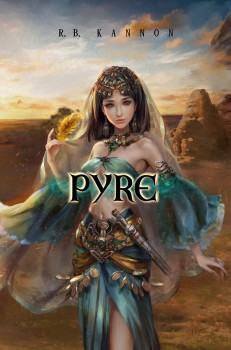Self-Published Book Review: Pyre by R. B. Kannon
If you have a book you’d like me to review, please see the submission guidelines here.

This month’s self-published book is Pyre by R.B. Kannon. Set in a desert land reminiscent of ancient Egypt, it tells the life story of Ember, scion of a ruined people.
When Ember was a small child, her mother locked her inside an ancient, abandoned temple to die. She did this because Ember is cursed. Her people have no dreams or visions, no hope or desire or love. They sacrificed those things to a long forgotten demigod. But Ember is different—she not only has those ordinary traits of humanity, her mere presence disturbs the dreamless sleep of her people, bringing them unwanted dreams and nightmares. So she was locked away in the temple, but she was not alone. The Voice was there, a demonic presence who bonds with her and frees them both.
At first, Ember is taken in by Azarus, the eunuch satrap of the province, who teaches her to read and write not only the common language, but also the ancient glyphs that cover the ruins littering the countryside. Years later, when Azarus is killed by the Emperor’s unfavored son, she flees, returning first to her own people, then falling in with prostitutes and bandits, before finally coming back to the temple, where she challenges the Voice to seek redemption not just for herself, but for her fallen people.
The strongest part of Pyre was the prose. The first person narration has a lyrical quality, filled with descriptions rich with dream-like imagery, slipping effortlessly between reality and Ember’s own dreams. Ember herself is strong and determined, qualities which initially drew the Voice to her. The Voice, on the other hand, is cynical and mocking. He accompanies Ember more out of curiosity and boredom, and his own chance at freedom and survival, than because he has any interest in her welfare.
The novel was not without its shortcomings. There are times when the prose waxes too lyrical. Dream and reality blur together and it’s hard to follow what is really happening and why. Perhaps that was the author’s intention, but I still found it vaguely unsatisfactory, like I was missing something obvious without knowing how to find it. For much of the book, Ember doesn’t seem to have a real goal or purpose aside from escaping, from Prince Kesh, from her people, from the brothel and the bandits. There’s no real drive to the plot until the end. Not that Ember herself is passive. She takes dramatic action to preserve her life and freedom, though she rarely has much purpose beyond self-preservation.
Besides Ember and the Voice, the other characters tend to fade into the background. A few were interesting: Azarus, Prince Kesh, the boy thief Hawk, but a lot of the other characters came and went without having much of a role or showing much depth. That said, the book was primarily about Ember’s journey and her relationship with the Voice. The other characters, even the interesting and important ones, only had a minor role in that.
All Ember’s relationships tend to be short-lived. While her mother often appears in her thoughts and dreams; it’s hard to separate Ember’s actual memories of her mother from what she imagines she remembers. She’s not even certain that Ember is her real name. For a time, Azarus was the most important person in her life, a teacher and important father figure; for while Ember at least remembers her mother, there’s no accompanying memories of her father. But with Azarus’s death and her flight from Prince Kesh, there’s no one to take his place, no family (aside from a chance encounter with Ember’s mother, who lacks the capacity to act like family) or even friends, for most of the novel. It’s not until she meets Hawk, near the end of the novel, that she forms a friendship with anyone, even if she has reason to distrust Hawk. In a lot of novels, this sort of relationship would turn into a romance before the end, but I’m kind of relieved the novel didn’t force a romance plot into the tail end of the story. I’m not sure it would have been possible to do it well.
Pyre is available on Amazon ($2.99 e-book and $8.99 paperback) and Barnes & Noble ($9.99 paperback).
Donald S. Crankshaw’s work first appeared in Black Gate in October 2012, in the short novel “A Phoenix in Darkness.” He lives online at www.donaldscrankshaw.com.